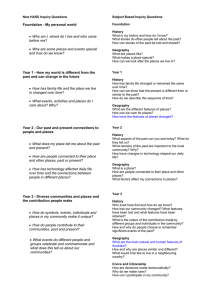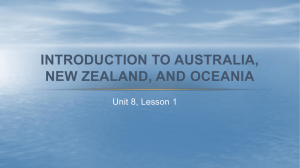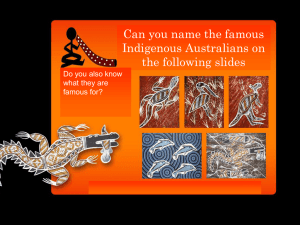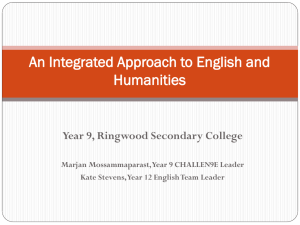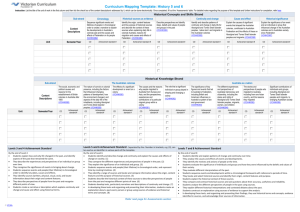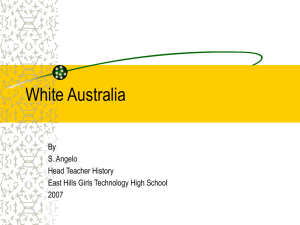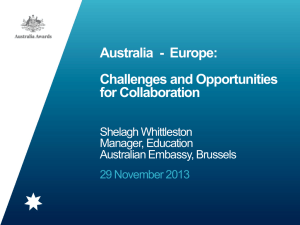Whole-day workshop for pre-service teachers
advertisement
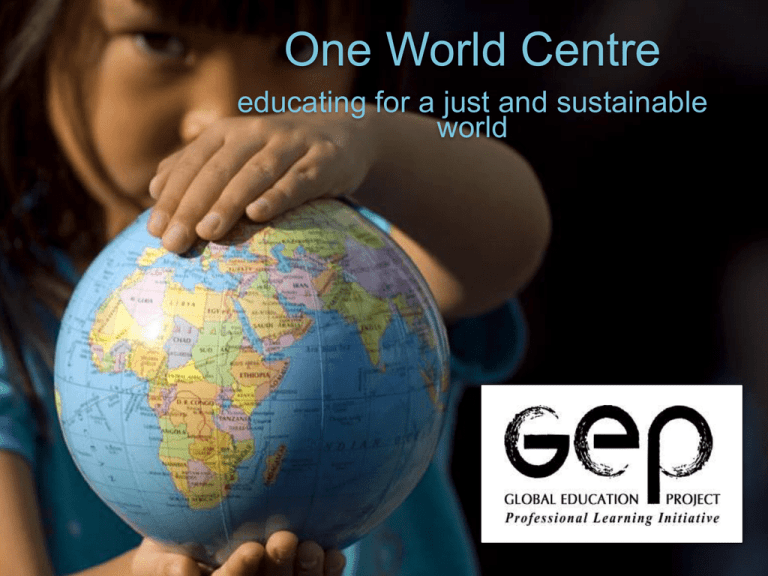
One World Centre educating for a just and sustainable world Global images Photo credits: AusAID and One World Centre Curriculum links: Year 1 English: Engage in conversations and discussions, using active listening behaviours, showing interest, and contributing ideas, information and questions (ACELY1656) Year 5 Science: Scientific understandings, discoveries and inventions are used to solve problems that directly affect peoples’ lives (ACSHE083) Year 10 Geography: The issues affecting the development of places and their impact on human well-being, drawing on a study from a developing country or region in Africa, South America or the Pacific islands. (ACHGK078) Global fact match Curriculum links: Year 1 – 10 Geography skills: Posing and developing geographical questions. Year 4, 5, 6 Geography: The location of the major countries from different regions (Africa, Asia, South America …) Year 9 Geography: Geographies of interconnections focuses on investigating how people, through their choices and actions, are connected to places throughout the world in a wide variety of ways, and how these connections help to make and change places and environments. The Danger of a Single Story – Chimimanda Adiche Image Credit: Chris Boland What’s Global Education? “Enabling young people to participate in a better shared future for all is at the heart of global education. Global education promotes open-mindedness leading to new thinking about the world and a predisposition to take action for change. Students learn to take responsibility for their actions, respect and value diversity, and see themselves as global citizens who can contribute to a more peaceful, just and sustainable world” Global Perspectives: A framework for global education in Australian Schools Commonwealth of Australia, 2008 Actions for Change • LEARN • TALK • BUY • DONATE • SHOUT • VOLUNTEER • LIVE http://www.globaleducation.edu.au/teaching-and-learning/school-case-studies.html Goal 2: All young Australians become successful learners, confident and creative individuals, and active and informed citizens 2008 Melbourne Declaration on Educational Goals for Young Australians. Active and informed citizens: are committed to national values of democracy, equity and justice, and participate in Australia’s civic life are able to relate to and communicate across cultures work for the common good, in particular sustaining and improving natural and social environments are responsible global and local citizens. act with moral and ethical integrity AC: 3 Cross curriculum priorities Sustainability: - environmental - social - political Aboriginal and Torres Strait Islander Histories and Cultures Asia and Australia’s Engagement with Asia Interconnectedness – here in Australia and beyond Diversity – being culturally competent, valuing the lives and stories of others Taking informed action for the future morning tea Morning tea The Election Curriculum links: Year 3 Civics and Citizenship: How and why decisions are made democratically in communities. Year 5 Geography: The influence of people, including Aboriginal and Torres Strait Islander Peoples, on the environmental characteristics of Australian places Year 10 History: The environment movement The intensification of environmental effects in the twentieth century as a result of population increase, urbanisation, increasing industrial production and trade Rockstrom, Sachs, Ohman & Schmit-Traub (2013) Sustainable Development & Planetary Boundaries. http://www.post2015hlp.org/wp-content/uploads/2013/06/Rockstroem-Sachs-Oehman-Schmidt-Traub_Sustainable-Development-and-Planetary-Boundaries.pdf http://www.chrisjordan.com/gallery/rtn NATURAL The conservation of living things, resources and support systems ECONOMIC Employment and income that is ongoing and fair Interlocking pillars of Sustainability (UNESCO) SOCIAL POLITICAL Peace, equality and human rights, especially for the most vulnerable Access to decision-making and influence over your own life and place Image: The Bridge Progressive Arts Initiative Australian Sustainable Schools Initiative (AuSSI-WA) Cool Australia – sustainability lesson plans and resources for early childhood – Yr 10 www.globalwords.edu.au The Development Compass Rose Natural These are questions about the environment - the land, the sea, living things, and their relationship to each other. These questions are about the built as well as the natural environment Who decides (political) These are questions about power, who makes choices and decides what is to happen; who benefits or loses as a result of these decisions; and at what cost Economic These questions are about money, trading and ownership, buying and selling Social These are questions about people, their relationships, their traditions, culture and the way they live. They include questions about how, for example, gender, race, disability, class and age affect social relations What are your questions? Brainstorm lunch lunch Image by Nadja Robot under Creative Commons License (CC BY-NC 2.0) Story time lunch Choose some specific content from the brainstorm Include ideas for evaluation Develop a series of learning activities: include aims and specific lesson ideas Identify Australian Curriculum Links: Learning areas, year level, CCPs, General capabilities Connection to the Global Education framework: consider GE themes and how activities develop values and attitudes, knowledge and understanding, skills, and capacity for taking action List relevant resources: books, AV materials, kits, online sources, experiential resources (guests, excursions, etc) Dodge ball and the “level playing field” Dodgeball 14 by Lightwork Studio 2. Creative Commons license (CC BY- NC - SA 2.0) Curriculum links: Year 6 Geography: The various connections Australia has with other countries and how these connections change people and places Year 9 Geography: Geographies of interconnections. The ways that places and people are interconnected with other places through trade in goods and services, at all scales Year 8 Economics and Business: The ways markets operate in Australia and why they may be influenced by government Year 7&8 Health and Physical Education: Movement and physical activity. Compose and perform movement sequences for specific purposes in a variety of contexts http://www.globaleducation.edu.au/ www.facebook.com/oneworldcentre www.twitter.com/oneworldcentre Contact us at: 5 King William St Bayswater 6053 Ph: (08) 9371 9133 www.oneworldcentre.org.au primaryed@oneworldcentre.org.au education@oneworldcentre.org.au




